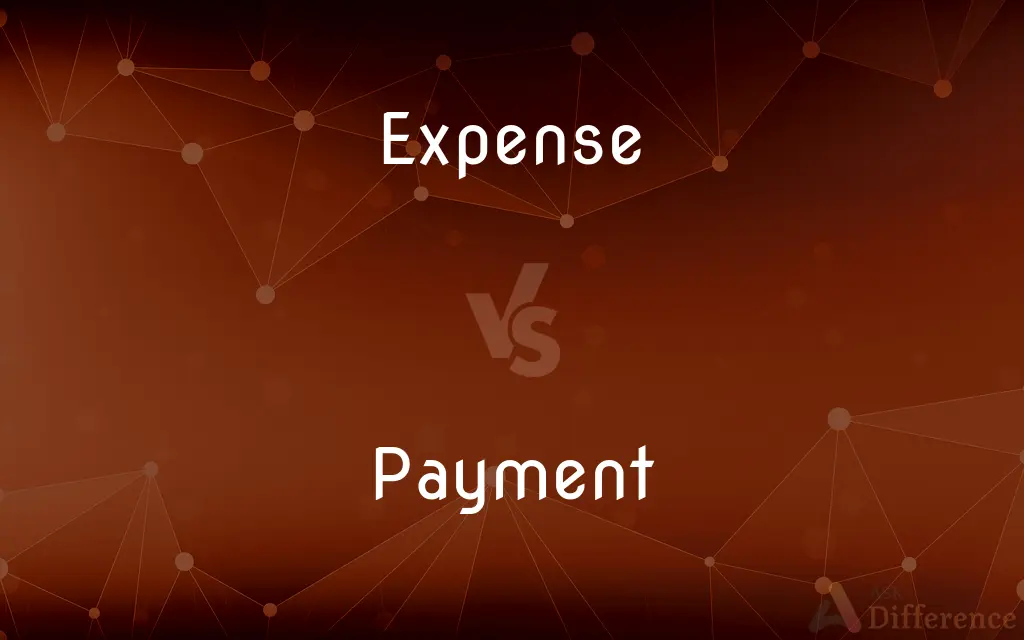Expense vs. Payment — What's the Difference?
By Tayyaba Rehman & Urooj Arif — Updated on May 2, 2024
Expense refers to the cost incurred for goods or services, focusing on financial outflow; payment is the actual transfer of money that settles these costs.

Difference Between Expense and Payment
Table of Contents
ADVERTISEMENT
Key Differences
Expense involves incurring costs as a result of purchasing goods or services, which is an accounting term that reflects how money is spent in a business or personal budget. Whereas, payment denotes the act of transferring money or its equivalents to fulfill a financial obligation, such as settling an expense.
Expenses can be planned, such as monthly utility bills, or unexpected, like emergency car repairs. On the other hand, payments are the deliberate actions taken to cover these costs, whether they are predictable or not.
Recording expenses is crucial for financial tracking and management, helping in budgeting and financial planning. Conversely, recording payments ensures that the debts are settled and reflects liquidity — the availability of cash to make these payments.
Expenses might not always require immediate payments; they can be accrued, such as in credit transactions where payment is deferred. In contrast, a payment is immediate or scheduled but is a definitive action towards settling an accrued expense.
While expenses are often categorized for financial analysis (e.g., operational, capital, or personal expenses), payments are simply the transactions that correspond to these categories, focusing more on the flow of money rather than its classification.
ADVERTISEMENT
Comparison Chart
Definition
Cost incurred from goods or services.
Transfer of money to settle a cost.
Timing
Can be immediate or accrued.
Usually immediate or scheduled.
Financial Reporting
Tracked for budgeting and analysis.
Tracked to ensure debts are settled.
Examples
Utility bills, salaries, rent.
Cash, checks, credit card payments.
Focus
Reflects financial outflow.
Reflects liquidity and cash flow.
Compare with Definitions
Expense
Cost incurred.
The monthly rent is a significant expense.
Payment
Act of paying.
Payment of the invoice ensures no interruption in service.
Expense
Financial charge.
The company recorded all expenses for the project.
Payment
Settling a bill.
The payment for the electricity bill is due tomorrow.
Expense
Budgeting item.
Travel expenses were higher this quarter.
Payment
Cash outflow.
The payment was made in full with cash.
Expense
Incurring cost.
He incurred a large expense from the car repair.
Payment
Financial transaction.
He handles the payment processing at work.
Expense
Economic outflow.
They reduced expenses by cutting unnecessary costs.
Payment
Money transfer.
She made a payment via online banking.
Expense
Expenditure is an outflow of money, or any form of fortune in general, to another person or group as payment for an item, service, or other category of costs. For a tenant, rent is an expense.
Payment
A payment is the voluntary tender of money or its equivalent or of things of value by one party (such as a person or company) to another in exchange for goods, or services provided by them, or to fulfill a legal obligation. The party making a payment is commonly called the payer, while the payee is the party receiving the payment.
Expense
The cost incurred in or required for something
Conference rooms were equipped at great expense
Book into the best hotel you can find and hang the expense
Payment
The act of paying or the state of being paid.
Expense
Offset (an item of expenditure) as an expense against taxable income
Up to $17,500 in capital expenditures can be expensed in the year they were incurred
Payment
An amount paid
Received a large payment.
Expense
Something spent to attain a goal or accomplish a purpose
An expense of time and energy on the project.
Payment
One's due, reward, or punishment; requital.
Expense
A loss for the sake of something gained; a sacrifice
Achieved speed at the expense of accuracy.
Payment
(uncountable) The act of paying.
Expense
An expenditure of money; a cost
An improvement that was well worth the expense.
A trip with all expenses paid.
Payment
(countable) An instance of that act; a sum of money paid in exchange#Noun for goods or services, or the transaction#Noun that conveys it.
Expense
Charges incurred by an employee in the performance of work
Was reimbursed for her travel expenses.
Payment
The act of paying, or giving compensation; the discharge of a debt or an obligation.
No man envieth the payment of a debt.
Expense
(Informal) Money allotted for payment of such charges.
Payment
That which is paid; the thing given in discharge of a debt, or an obligation, or in fulfillment of a promise; reward; recompense; requital; return.
Expense
Something requiring the expenditure of money
Redecorating the house will be a considerable expense.
Payment
Punishment; chastisement.
Expense
(Archaic) The act of expending.
Payment
A sum of money paid
Expense
To charge with expenses.
Payment
The act of paying money
Expense
To write off as an expense.
Expense
A spending or consuming, often a disbursement of funds.
She went to great expense to ensure her children would get the best education.
Buying the car was a big expense, but will be worth it in the long run.
We had a training weekend in New York, at the expense of our company.
Expense
The elimination or consumption of something, sometimes with the notion of loss or damage to the thing eliminated.
Jones reached the final at the expense of Smith, who couldn't beat him.
Expense
(obsolete) Loss.
Expense
(transitive) To charge a cost against an expense account; to bill something to the company for which one works.
It should be acceptable to expense a business lunch with a client.
Expense
A spending or consuming; disbursement; expenditure.
Husband nature's riches from expense.
Expense
That which is expended, laid out, or consumed; cost; outlay; charge; - sometimes with the notion of loss or damage to those on whom the expense falls; as, the expenses of war; an expense of time.
Courting popularity at his party's expense.
Expense
Loss.
And moan the expense of many a vanished sight.
Expense
Amounts paid for goods and services that may be currently tax deductible (as opposed to capital expenditures)
Expense
A detriment or sacrifice;
At the expense of
Expense
Money spent to perform work and usually reimbursed by an employer;
He kept a careful record of his expenses at the meeting
Common Curiosities
Is every payment considered an expense?
Not all payments are expenses; some might be transfers or investments.
Can an expense exist without a payment?
Yes, expenses can be accrued without immediate payment, especially in credit situations.
What is the main difference between an expense and a payment?
An expense is the cost incurred from goods or services, while a payment is the act of transferring money to settle that cost.
Why is distinguishing between expenses and payments important?
Distinguishing helps in accurate financial reporting and effective budget management.
What is an example of a payment that is not an expense?
Transferring money between bank accounts is a payment but not an expense.
How do businesses track expenses and payments?
Businesses use accounting systems to track expenses for budgeting and payments for cash flow management.
What types of payments are there?
Payments can be made in cash, by credit, electronic transfers, or checks.
What are examples of personal expenses and payments?
Personal expenses include groceries and rent; payments could be made by cash, credit, or debit.
How does timing affect expenses and payments?
Expenses can be recognized before or at the time of payment, affecting financial statements differently.
Can you have an expense without an immediate outflow of cash?
Yes, such as in credit purchases where payment is deferred.
What role do expenses play in budgeting?
Expenses help in planning financial outflows and ensuring funds are used wisely.
How do payments impact financial stability?
Regular and timely payments help maintain financial stability and creditworthiness.
Can payments affect a business's liquidity?
Yes, payments impact liquidity by reducing the cash available to meet other obligations.
Are expenses always monetary?
While typically monetary, expenses can also include non-monetary costs like depreciation.
Share Your Discovery

Previous Comparison
Figured vs. Figure
Next Comparison
Hype vs. PropagandaAuthor Spotlight
Written by
Tayyaba RehmanTayyaba Rehman is a distinguished writer, currently serving as a primary contributor to askdifference.com. As a researcher in semantics and etymology, Tayyaba's passion for the complexity of languages and their distinctions has found a perfect home on the platform. Tayyaba delves into the intricacies of language, distinguishing between commonly confused words and phrases, thereby providing clarity for readers worldwide.
Co-written by
Urooj ArifUrooj is a skilled content writer at Ask Difference, known for her exceptional ability to simplify complex topics into engaging and informative content. With a passion for research and a flair for clear, concise writing, she consistently delivers articles that resonate with our diverse audience.
















































